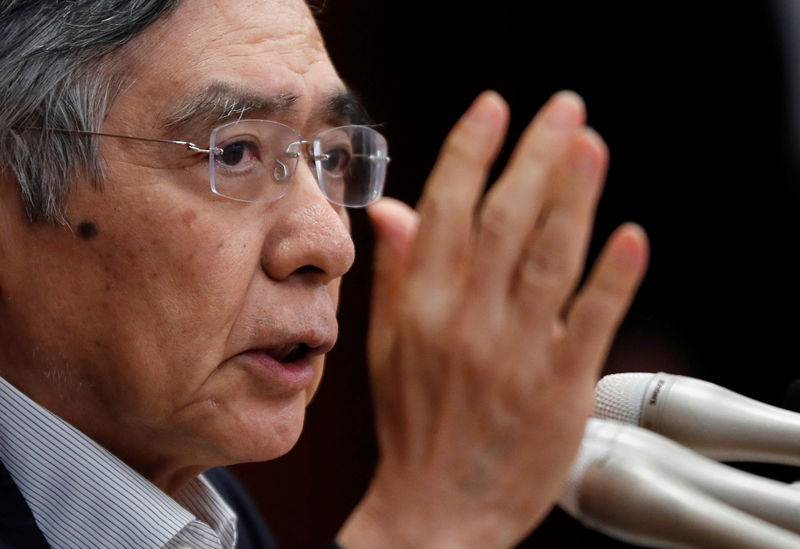By Leika Kihara
OSAKA (Reuters) - Bank of Japan Governor Haruhiko Kuroda said on Tuesday the central bank has entered a phase where it must consider not just the merits but the side-effects of its massive stimulus program in a "balanced manner".
He also said the BOJ's new commitment to keep interest rates very low for an "extended period" did not mean near-zero rates will be maintained permanently, reminding markets that the central bank could raise rates if the inflation rate picks up.
"We hope to achieve 2 percent inflation at the earliest date possible by maintaining our powerful monetary easing, so that we can begin normalizing monetary policy," Kuroda said.
Kuroda said that while he would not rule out changing the commitment, it was an appropriate one for now as inflation remains distant from the BOJ's target.
While his remarks do not suggest an immediate policy change, they leave the door open to a shift and underscore a growing sense in the BOJ that it cannot sustain its massive, radical stimulus without focusing on the policy's side-effects.
Sources of concern are the rising cost and diminishing returns of the stimulus, which has eroded commercial banks' profits via ultra-low rates and failed to fire up inflation to its elusive 2 percent target.
In minutes of the BOJ's July meeting, released earlier on Tuesday, a few policymakers warned that the central bank must consider more seriously the potential dangers of ultra-easy policy, such as damage to the banking system.
Kuroda said while wages and prices are turning up, reflecting a strengthening economic recovery, achievement of his 2 percent target was taking more time than expected.
"Under such a fairly complex economic and price situation, monetary policy must take into account various developments in a comprehensive manner," he told business leaders in Osaka.
"This means that, in continuing with powerful monetary easing, we now need to consider both its positive effects and side-effects in a balanced manner," he said.
Kuroda also said there was no change to the BOJ's stance of seeking "stable prices" that contributed to the sound development of the economy.
"The BOJ will continue to make its utmost efforts to firmly support corporate activity, taking into account economic, price and financial developments," he said.
The remarks, which made no explicit mention of the price target, were in contrast to those made until earlier this year, in which Kuroda repeatedly said the BOJ would strive for 2 percent inflation.
GOVT, BOJ ON SAME PAGE
Mindful of the rising cost of prolonged easing, the BOJ took steps in July to make its policy framework more sustainable, such as by letting bond yields move more flexibly around its zero percent target.
Politicians, who once pressured the BOJ to ramp up stimulus to beat deflation, have sent signals that they are more amenable to the idea of an exit from easy policy.
Prime Minister Shinzo Abe said last week his key economic policy goal has been fulfilled, with job losses at record lows, signaling he was no longer persisting on achieving 2 percent inflation.
Kuroda dismissed the idea that the government was becoming more relaxed about meeting the price goal, saying Abe's comments reflected the fact the government had a broader mandate than the BOJ does.

"I don't think there's a big gap in view between the government and the BOJ" on the need to meet the price target, Kuroda said, stressing he saw no need to change the target or make it a longer-run goal.